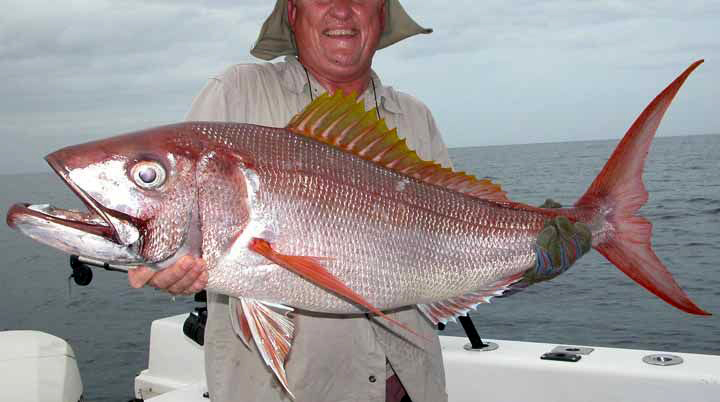Rusty Jobfish, Aphareus rutilans Cuvier 1830

A Rusty Jobfish, Aphareus rutilans, from St. Lazarus Bank, Mozambique. Source: Robert J. Koch / FishWise Professional. License: CC BY Attribution-Noncommercial-ShareAlike
Rusty Jobfish, Aphareus rutilans Cuvier 1830
More Info
|
Distribution |
Scott Reef, Western Australia, and the Arafura Sea, Northern Territory, and the northern Great Barrier Reef, Queensland, and reefs in the Coral Sea, with larvae south to Crowdy Head, New South Wales. Elsewhere the species occurs in the tropical Indo-west-central Pacific, and in the southeast Atlantic off southern South Africa. Individuals or small schools occur over reefs and rocky areas at depths to 250 m, and possibly to 350 m. |
|
Features |
Dorsal fin X, 10-11; Anal fin III, 8; Gill rakers 16-19 + 32-35 = 49–52; Lateral-line scales 69-75. Body elongate, caudal fin large, deeply forked or lunate. Mouth large, lower jaw protruding, maxilla reaching to below middle of eye; jaw teeth minute; interorbital space flattened. Dorsal fin long-based, not deeply incised at junction of the spinous and soft-rayed portions; posteriormost ray of dorsal and anal fins elongate. |
|
Feeding |
Feeds on fishes, squids and crustaceans. |
|
Biology |
Grows to a maximum age of 18 years, and matures at about 3.8 years and ~65 cm FL, and attains a estimated maximum age of 18 years. Spawning occurs during spring and summer. |
|
Fisheries |
Taken on handlines and longlines in deep-water fisheries throughout its range. |
|
Conservation |
|
|
Similar Species |
Differs from the Smalltooth Jobfish, Aphareus furca in coloration and gill raker counts. The Smalltooth Jobfish is steely-blue to purplish-brown above and silvery purple below, and has 22-28 gill rakers on the first gill arch (vs. 149-52 in the Rusty Jobfish). |
|
Etymology |
The specific name is from the Latin rutilans (= reddening, becoming red) in reference to the reddish colour of this species. |
|
Species Citation |
Aphareus rutilans Cuvier, in Cuvier & Valenciennes 1830, Histoire Naturelle des Poissons 6: 490. Type locality: Red Sea. |
|
Author |
Bray, D.J. 2020 |
|
Resources |
Rusty Jobfish, Aphareus rutilans Cuvier 1830
References
Allan, R. 2002. Australian Fish and How to Catch Them. Sydney : New Holland Publishers (Australia) 394 pp.
Allen, G.R. 1985. FAO Species Catalogue. Snappers of the World. An annotated and illustrated catalogue of lutjanid species known to date. FAO Fisheries Synopsis No. 125, Vol. 6. Rome : FAO 208 pp.
Allen, G.R. 1997. Marine Fishes of Tropical Australia and South-east Asia. Perth : Western Australian Museum 292 pp. 106 pls.
Allen, G.R. & Swainston, R. 1988. The Marine Fishes of North-Western Australia. A field guide for anglers and divers. Perth, WA : Western Australian Museum vi 201 pp., 70 pls.
Anderson, W.D., Jr. 1987. Systematics of the fishes of the family Lutjanidae (Perciformes: Percoidei), the snappers. pp. 1-31 in Polovina, J.J. & Ralston, S. (eds). Tropical Snappers and Groupers: Biology and Fisheries Management. Boulder : Westview Press Inc. 659 pp.
Anderson, W.D. & Allen, G.R. 2001. Lutjanidae. pp. 2840-2918 in Carpenter, K.E. & Niem, V.H. (eds). The Living Marine Resources of the Western Central Pacific. FAO Species Identification Guide for Fisheries Purposes. Rome : FAO Vol. 5 2791-3379 pp.
Cuvier, G.L. in Cuvier, G.L. & Valenciennes, A. 1830. Histoire Naturelle des Poissons. Paris : Levrault Vol. 6 559 pp. pls 141-169. See ref at BHL
Holmes, B. 2006. Deepwater Fish Field Guide, Queensland Deepwater Fin Fish Fishery. Brisbane : Department of Primary Industries and Fisheries 16 pp.
Hutchins, J.B., Williams, D.McB., Newman, S.J., Cappo, M. & Speare, P. 1995. New records of fishes for the Rowley Shoals and Scott/Seringapatam Reefs, off north-western Australia. Records of the Western Australian Museum 17: 119-123.
Leis, J.M. & Lee, K. 1994. Larval deveopment in the lutjanid subfamily Etelinae (Pisces): the genera Aphareus, Aprion, Etelis and Pristipomoides. Bulletin of Marine Science 55(1): 46-125.
Marshall, T.C. 1964. Fishes of the Great Barrier Reef and Coastal Waters of Queensland. Sydney : Angus & Robertson 566 pp. 136 pls.
Martinez-Andrade, F. 2003. A comparison of life histories and ecological aspects among snappers (Pisces: Lutjanidae). LSU Doctoral Dissertations. 2271. https://digitalcommons.lsu.edu/gradschool_dissertations/2271
Randall, J.E. 2005. Reef and shore fishes of the South Pacific. New Caledonia to Tahiti and the Pitcairn Islands. Honolulu : University of Hawaii Press 707 pp.
Randall, J.E., Allen, G.R. & Steene, R. 1997. Fishes of the Great Barrier Reef and Coral Sea. Bathurst : Crawford House Press 557 pp. figs.
Russell, B., Smith-Vaniz, W.F., Lawrence, A., Carpenter, K.E., Myers, R. & Thaman, R. 2016. Aphareus rutilans. The IUCN Red List of Threatened Species 2016: e.T194360A2321168. http://dx.doi.org/10.2305/IUCN.UK.2016-3.RLTS.T194360A2321168.en. Downloaded on 04 September 2017.





